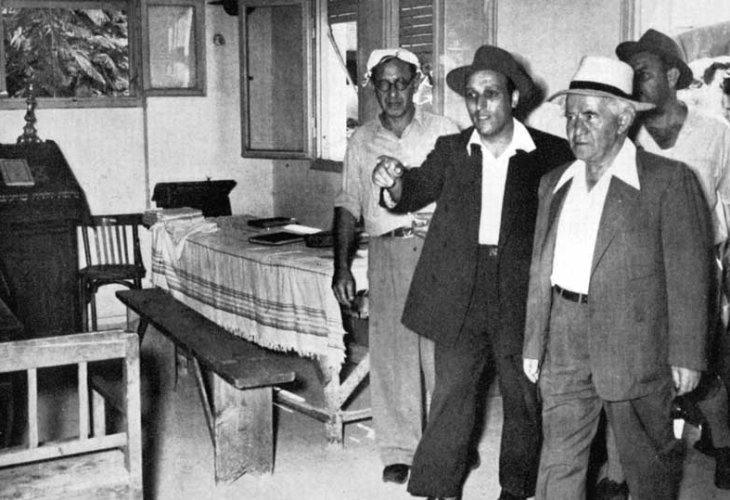A Historic Encounter: Ben-Gurion and the Chazon Ish
An Empty Wagon: The intriguing story of the conversation between Israel's first Prime Minister and the revered rabbi, as revealed by Yitzhak Navon, Ben-Gurion's personal secretary.

Year: 1956. Location: Bnei Brak
Many legends have been woven around the historical meeting on the 9th of Cheshvan, 1956, between the revered Chazon Ish and then-Prime Minister David Ben-Gurion.
This meeting was pivotal for discussions about the conscription of yeshiva students and the Jewish identity of the State of Israel. It was rumored that the Chazon Ish spoke sharply against Ben-Gurion, with quotes appearing in commemorative books about the Chazon Ish. However, Yitzhak Navon, who served as Ben-Gurion's personal secretary, is the only direct source of what actually transpired.
Navon recalls, "Back then, the topic of drafting women was making headlines, and leaders of the Agudat Yisrael workers said that the Chazon Ish's opinion would be decisive. So, Ben-Gurion turned to Rabbi Binyamin Mintz and asked him to arrange a meeting with the rabbi. Mintz approached the Chazon Ish, who said, 'My door is open; whoever wants to come is welcome.'"
"Thus, Ben-Gurion came to Bnei Brak that day, arriving in an official car, surrounded by security. Hundreds had already gathered around the house. The Chazon Ish opened the door and welcomed us. People thought he would discuss the drafting of women, which was then in the headlines, but it didn't come up at all. They did, however, discuss the drafting of yeshiva students."
.jpg)
"The Chazon Ish lived in a simple home, with little more than a table, a chair, a rickety bed, and books. I had heard so much about the Chazon Ish, expecting a towering figure. However, he was short, stooped, almost invisible, but his eyes were incredibly sharp, penetrating. Even Ben-Gurion later remarked on the Chazon Ish's eyes," Navon shares.
Ben-Gurion began by stating, 'I came here to ask you how religious and non-religious Jews can live together without tearing apart from within.' The Chazon Ish then shared the famous parable from the Gemara about the law that if two camels meet on a narrow path, and one is carrying a load while the other is not, the camel without a load must yield to the loaded camel. The Chazon Ish explained, 'We religious Jews are like the loaded camel because we bear the burden of many commandments, which is why you must clear the way for us.' His argument was that the religious carry the burden of obligatory commandments, unlike the secular, who have no binding obligations."
Ben-Gurion responded by patting his own shoulder and saying, 'And this camel bears no burden? Isn't the commandment of settling the Land of Israel a mitzvah? Isn't the commandment of protecting lives a mitzvah? And what about the young men you oppose, who sit at the borders and protect you, isn't that a mitzvah?'
The Chazon Ish replied, 'By our studying Torah, we ensure their survival.'
Ben-Gurion said, 'If these young men did not defend you, the enemies would slaughter you.'
The Chazon Ish countered, 'On the contrary. Because we study Torah, they can live, work, and defend. The Torah is the tree of life, the elixir of life.'
Ben-Gurion continued, 'Defending lives is also a mitzvah. For it is not the dead who praise the Lord. Still, how will we live together?'
The Chazon Ish answered, 'I see Shabbat desecration, cars and trucks driving to the sea on Shabbat, instead of praying and studying Torah. It is shocking to see such Shabbat desecration in our ancestral land.'
Ben-Gurion replied, 'I myself don't go to the sea on Shabbat, but if there are workers who toil all week and go to the sea on Shabbat, we can't prevent it. We cannot force Shabbat observance. And if they don't go to the sea, will they come to the synagogue?'
The Chazon Ish replied, 'I believe the day will come when everyone will observe Shabbat and pray.'
Ben-Gurion concluded, 'If they wish, we won't prevent it, but without coercion, neither religious nor anti-religious.' Thus, the discussion continued for a long time."
A writer who had heard snippets of the conversation added his own imagination, fabricating details that never happened.

Navon clarifies, "Only the story I told is what truly transpired there. Some wrote that things were said there that I didn't understand because Ben-Gurion and the Chazon Ish spoke Yiddish." This is unreasonable, as Ben-Gurion strictly spoke only Hebrew. "They spoke only Hebrew in this meeting as well," Navon attests.
And how did the meeting end? Navon recalls and describes, "The two stood and approached the bookcase. Ben-Gurion showed interest in some of the books, and then they parted amicably with a handshake."
"After the meeting, Ben-Gurion told me, 'This is a man of character; he has wise eyes, he is modest.' He was very impressed by the visit and continued to say, 'We need to find a way to live together. Otherwise, it's a bigger danger than the external enemy.'"
Since then, that meeting has become a milestone in the history of relations between the Haredi public and the State of Israel.

